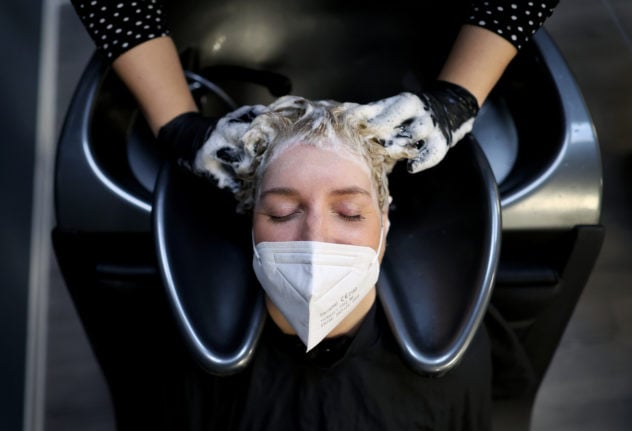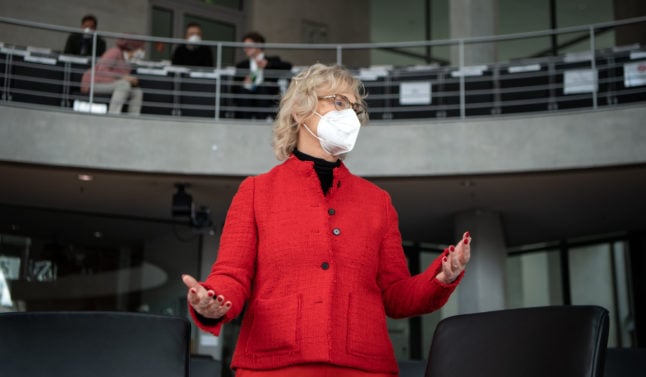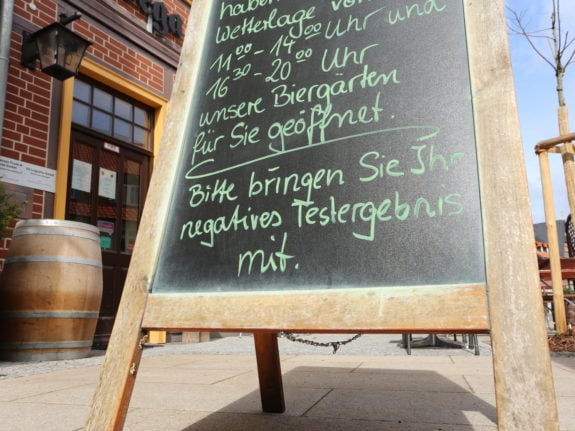The German Bundestag and Bundesrat have both approved the new measures for the relaxing of Covid-19 rules for people who are either fully vaccinated or recovered from Covid-19.
That means the new freedoms can come into force this Sunday.
READ ALSO: Germany to allow freedoms for Covid-vaccinated people from Sunday
About 31.5 percent of the population had received at least one jab up to May 6th, and 8.8 percent had been fully inoculated – meaning just under 10 percent of people would currently be eligible for increased freedoms, not including those who have recovered from the virus.
Here’s what you need to know about the new carve-outs to Covid rules for the vaccinated and recovered.
Meeting friends and family
Under the new law, contact restrictions will no longer apply for anyone who’s either vaccinated against Covid or recovered. It means any number of people can meet if they belong to these immune groups. Currently in areas with more than 100 Covid cases per 100,000 residents in seven days, a household is only allowed to meet with one other person. In other areas two households are allowed to meet with up to five people in attendance.
READ ALSO:
- Germany moves to relax Covid rules for vaccinated people
- ‘The only way forward’: Should Germany introduce a Covid-19 immunity passport?
Further, recovered or vaccinated people won’t be officially counted as part of a social gathering, even in high-incidence areas where households are only allowed to meet with one other person. So if all but one of your friends are vaccinated and you two are still stuck on the waiting list, you can both join their gatherings without worrying about breaking the rules.
Evening curfew
In areas with a 7-day incidence of more than 100 infections per 100,000 inhabitants, nationwide emergency brake rules prohibit people leaving the house between 10pm and 5am, other than for exercise (until midnight in most places) or essential reasons like work or a medical emergency.
READ ALSO: EXPLAINED – What you need to know about Germany’s new nationwide Covid-19 rules
For those lucky enough to be eligible for the exceptions, there will be no more scuttling home in a hurry after sunset to meet the night-time curfew. Much like the contact restrictions, curfew rules will cease to apply to vaccinated or recovered people, meaning they can happily meet for a midnight drink in a park of their choice – once again, with as many of their vaccinated friends as they like.
Travelling abroad
Those who understandably decide to jet off on holiday after having their full inoculation will no longer have to present a negative Covid test on their return. Instead, they’ll be asked to present their vaccination certificate. In addition, they won’t have to go into quarantine after entering Germany, unless they’ve knowingly had contact with somebody infected with the virus during their time abroad.
However, there is still requirement to quarantine if coming from a region classed as a virus variant area of concern.
Of course, this may not be a licence to travel without hassle. Though Germany is easing their restrictions for the vaccinated and recovered, other countries may not follow suit, and there could well be demands for negative tests or periods of self-isolation when entering another country.
READ ALSO: When will Germany relax restrictions on international and domestic travel?
Leisure activities, shops and services
According to the law, people who fall into these new “low-risk” groups – the vaccinated and recovered – will be treated in much the same way as those with a negative test. In some states, such as Berlin, people who can present a negative test are entitled to access some services that are otherwise closed to the public, such as hairdressers and non-essential shops. Under the government’s new plans, the same would apply to anyone who’s had their full vaccination or who has recovered from Covid-19.

Photo: DPA
Other than that, there are currently no plans for a special reopening of pubs, restaurants, cinemas, etc., for those deemed to be lower risk. Though some politicians had pushed for wider privileges for these lower risk groups, the government is trying to avoid provoking too much anger among the significant proportion of the population who haven’t had their jab just yet.
Sport
The restrictions that mean contactless individual sport is only allowed alone, in pairs or with members of your own household are lifted for those who have been vaccinated and those who have recovered.
Masks and distancing remain
General safety rules such as mandatory masks and keeping a distance will still apply to people with immunity.
So, no vaccinated-only club nights?
Not at present, although this is one of the issues that could well crop up over the coming weeks and months, as infection rates fall and Germany’s leisure and hospitality businesses start to reopen their doors.
If states apply the same principle as many have done with hairdressers and other non-essential services, it could lead to a two-tier situation in which only certain groups in the population are allowed to stay in hotels, visit the cinema or go for drinks in a bar. At this point, there could well be trouble for politicians.
How will authorities know who’s entitled to the new freedoms?
Naturally, the authorities won’t just take your word for it that you’re one of the select few. Anyone who wants to take advantage of their new freedoms will have to present electronic or paper evidence – in either German, English, French, Italian or Spanish – that they are fully vaccinated.
Equally, the vaccine itself will have to be approved for use in the EU, which means Biontech/Pfizer, Moderna, Astrazeneca and Johnson & Johnson all count – but Russia’s Sputnik V currently does not.
People are considered fully vaccinated from the 15th day (so, two weeks) after the second dose.
READ ALSO: What you need to know about Germany’s controversial bid to buy Russia’s Sputnik vaccine
For the ‘recovered’ group, a positive PCR-Test that was taken at least 28 days ago, but is not more than six months old, will suffice. If the PCR-test was taken more than six months ago, the test will need to be accompanied by a vaccination certificate that proves you’ve had at least one dose of the vaccine so far.
Why is this happening now?
Both the federal government and individual states have been mulling over separate rules for the vaccinated for a while – and a handful of states have already introduced their own two-tier systems.
As the nationwide inoculation programme gains pace, Baden-Württemberg, Bavaria, Berlin, Brandenburg, Bremen, Hamburg and Hesse have all opted to offer new freedoms for the vaccinated – in most cases, treating them in much the same way as those with negative tests. Depending on the state, this can mean anything from being able to visiting the zoo to being entitled to book shopping appointments at non-essential shops.
READ ALSO: Germany breaks European record by giving a million Covid jabs in a day
Justice Minister Christine Lambrecht (SPD), one of the leading figures involved in the drafting of the law, has argued that since people who have been fully vaccinated have been shown to pose minimal risk to those around them, restricting their rights is unconstitutional.
“This is not about special rights or privileges, but about a central requirement of our constitutional state,” she told Tagesspiegel. “The constitution only allows restrictions on our basic rights if there is a special justification for this. The protection of life and health in the pandemic is such a justification.”

Christine Lambrecht. Photo: DPA
Over the past few months, Germany’s pro-business Free Democrats has been clamouring for vaccinated people to regain their freedoms so that businesses, and public life, are allowed to resume. Now more and more people – including the very young – are finally in line for a vaccination, these discussions have intensified.
The draft law seems to be an attempt to walk a thin line between appeasing those who have pushed for greater freedoms, and ensuring that those who aren’t vaccinated aren’t made to feel like second-class citizens.
What are the issue with the new plans?
Though proponents of the plans say that they are adhering to the German constitution, others believe that the new law could cause difficulties by contracting federal laws that mandate equal treatment of all citizens.
Equally, since the option to receive a vaccination should be a right rather than an obligation, the law must not be seen as a back-door attempt to force more people to opt for inoculation.
Another issue that could arise is that states will be able to diverge from the rules by adding additional freedoms on top of the ones mandated by the federal government, leading to a wide patchwork of rules across Germany.
In any case, expect there to be controversy in the coming weeks as the government thrashes out the specifics of the new rules – and potentially an even larger backlash if two-tier rules are imposed on pubs and restaurants in the summer.



 Please whitelist us to continue reading.
Please whitelist us to continue reading.
Papers please… new freedoms, really. Goodbye Germany.
Most other countries are doing the same thing
that is some bullshit. so in return for being in good health, sticking to lockdown restrictions, social distancing, masking, travel restrictions etc for a year, in short being a good citizen, and waiting your turn for vaccination, which may not come until july because you’re not a priority and the government has botched the roll-out, you get a big fuck you? what a fucking joke
For any readily communicable airborne or droplet disease that has an available, safe, approved vaccine (COVID19, measles, influenza), people do not have the right to make others sick. Those vaccinations should be made mandatory requirements for employment, to enter a school, hospital, or to enter a government office, with only medical exemptions. It is already internationally acceptable and standard practice to forcibly quarantine persons with active TB infections, particularly MDR or XDR, if they do not confine themselves.
To risk infecting others with an easily preventable disease is immoral and should be criminal. How about a little collective responsibility?
This is going too far. Vaccines are a personal choice. If you’re at risk from serious harm from contracting COVID, then get a vaccine. I have asthma. So I’ll get vaccinated. I’m responsible for protecting myself. But you can’t force other people to get vaccinated. That’s an unnecessary restriction of basic freedoms, and a slippery slope.
Without a vaccine you’re not just a potential victim, you’re a potential vector of the disease as well.
True. But if vulnerable people are vaccinated, being a vector has little consequence. We don’t insist that everyone gets a flu vaccine every year. But all vulnerable people with any sense get vaccinated. That seems to work fine. Why is COVID any different?